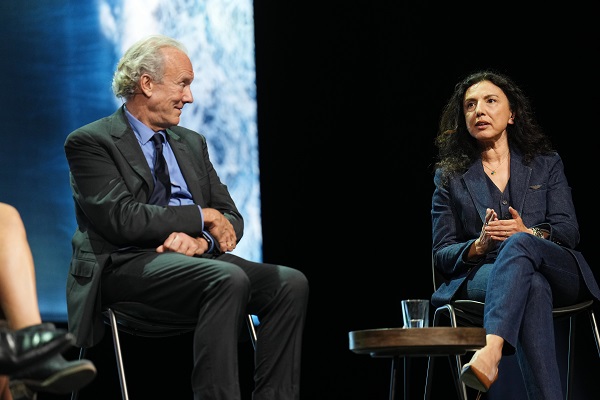When it comes to circularity in fashion, it is probably the most impactful purpose led initiative that the industry can do, by extending the life of an item through repairing, reusing and recycling. The unveiling of the digital ID last year, which is a global identification system for apparel products in the circular economy that enables resellers and recyclers to access, identify and share essential product and material information, was also a step in the right direction towards industry-wide c
e circularity.
Old dog new tricks
Even old stalwarts like Ralph Lauren are getting in on the circular economy. Most people have this perception of the brand being this big Seventh Avenue main street fashion brand, but the reality is that things are changing in their world too.
Back in June, it announced its ‘Live On’ promise, and revealed that its iconic cashmere sweater will be the first-of-its-kind luxury Cradle to Cradle (C2C) certified product.
Cradle to Cradle certification is the global standard for products that are safe, circular and responsibly made.
Moreover, by 2025, the brand will also invest in scaling regenerative practices – such as the U.S. Regenerative Cotton Fund – and innovative technologies like Natural Fibre Welding, a leading sustainable material science startup that is scaling a new industry standard for natural fibre recycling.
Speaking at the recent Global Fashion Summit : Copenhagen Edition, Halide Alagöz, chief product officer at Ralph Lauren Corporation, was quick to point out that the purpose statement of the brand focused on “to inspire the dream of a better life through authentic and timeless style”.
“A couple of years ago, we added circularity into our sustainability strategy, and our latest and enhanced brand purpose statement is now Timeless By Design.”
By 2030, the brand is committed to its ‘Live On’ promise, with a focus on material choices that are being evaluated through the lens of circularity.
It is also working on creating opportunities for its customers to be part of its system for repairs, recycling, rentals and resales initiatives.
COPENHAGEN, DENMARK – JUNE 07: during Day One of the Global Fashion Summit: Copenhagen Edition 2022 at Royal Opera House on June 07, 2022 in Copenhagen, Denmark. (Photo by Lars Ronbog/Getty Images for Copenhagen Fashion Summit)
Timelessly mindful
William McDonough, chief executive of McDonough Innovation, is a big fan of what Ralph Lauren is doing in this space, and he believes that the brand has got the right approach towards circularity.
“When someone asked me about sustainability in fast fashion a long time ago, I coined the experience as being timefully mindless, but with Ralph Lauren, what they’re doing is being timelessly mindful.”
He feels that everyone needs to understand the timeframe in the circular space is endless. Using resources over and over again can contribute towards economic growth in a responsible manner.
“Fashion is a verb, to fashion something, so let’s fashion the world that we want, let’s give our children the tools they need to fashion a world that they want. It’s going to take forever, but that’s the point.”
He believes that we need to understand the bigger picture surrounding fashion’s circular economy.
The two circles
“There are two circles in our lives, the biosphere and the technosphere. Nature is the regenerative biosphere and the technosphere is the circular economy.”
He feels that if humanity works towards making technology and utilising resources in such a way as to not contaminate the biosphere, we can actually grow the economy with grace and dignity.
“We are not in a new era of working together, I would say we are in a new epoch of working together. Let’s work together and design an economy that is tuned towards turning natural sources into resources that can be used in a circular manner.”
COPENHAGEN, DENMARK – JUNE 07: Mustafain Munir speaks during the Global. Alliances and Circularity : How Close Are We? panel talk during Day One of the Global Fashion Summit: Copenhagen Edition 2022 at Royal Opera House on June 07, 2022 in Copenhagen, Denmark. (Photo by Lars Ronbog/Getty Images for Copenhagen Fashion Summit)
Mustafain Munir, director at Cyclo in Bangladesh, believes this conversation around circularity is becoming a more important topic especially in countries that are struggling economically right now.
“The company that I run, and operate, is designed for circularity from the very beginning, so in a lot of ways, I’m lucky, so what’s good for my bottom line is actually good for the environment and for circularity goals.”
For the uninitiated, Cyclo pioneered a closed-loop production system to upcycle pre-consumer textile waste, and they produce recycled fibres that are commercially applicable yarn that is internationally recognised for apparel and textile applications.
He feels that the way forward is to have suppliers work together, in order to find like minded individuals who can work through issues, and have an incentivised system that rewards factories to turn in their waste through proper channels.
On the ground
Priyanka Khana, head of Asia expansion at Fashion for Good, gave a brief overview of the non-profit’s work in the Asian marketplace.
“On the supply side, we are talking about how we organise the waste so that it can be accessible to recyclers, and on the demand side, it’s about developing technologies to enable recycling.”
According to Khana, in some cases, not all the waste in the entire supply chain needs to be recycled, as some of it can actually be reused multiple times, before ultimately undergoing chemical-based recycling.
The non-profit is focused on circularity in India, as the country is a major production hub and consumption hub with a population well over a billion.
“Our efforts in the last six months, with feet on the ground, have been around talking to hundreds of stakeholders, manufacturers, informal aggregators, and starting to build solutions to promote circularity.”
The organisation is working towards increasing traceability within the pre-consumer market and post-consumer space as well, so that recyclers can better manage their resources and trace the origins of their materials for repurposing.
COPENHAGEN, DENMARK – JUNE 07: Moderator Dana Thomas, , Priyanka Khanna, William McDonough, Halide Alagoz, and Mustafain Munir speak during the Global. Alliances and Circularity : How Close Are We? panel talk during Day One of the Global Fashion Summit: Copenhagen Edition 2022 at Royal Opera House on June 07, 2022 in Copenhagen, Denmark. (Photo by Lars Ronbog/Getty Images for Copenhagen Fashion Summit)







